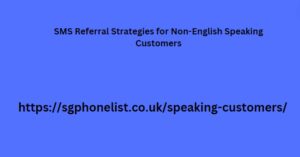Customer contact databases are the lifeblood of any business that thrives on relationships. But with a vast array of options and technical jargon, navigating this world can be overwhelming.
Guide to Customer Contact Databases
This guide cuts through the confusion, equipping you with the knowledge to choose and manage a customer contact database that empowers your business.
Understanding Customer Contact Databases
At its core, a customer SMS Referral Strategies for Non-English Speaking Customers contact database is an organized system for storing and managing customer information. This information can include:
- Basic details: Name, contact details (phone number, email address)
- Transaction history: Past purchases, service interactions
- Preferences: Communication preferences, product interests
Benefits of a Customer Contact Database
- Enhanced Organization: Ditch the scattered spreadsheets and sticky notes. A database keeps all your customer data centralized and easily accessible.
- Streamlined Communication: Effortlessly launch targeted marketing campaigns or personalize outreach programs directly from your database.
- Data-Driven Decisions: Leverage customer insights to understand buying behaviors, identify trends, and make informed business decisions.
- Improved Customer Relationships: Personalized interactions based on past experiences foster stronger customer loyalty.
- Boosted Efficiency: Save time and resources by eliminating the need to manually search for customer information.
Types of Customer Contact Databases
- Spreadsheets: A simple starting point for small businesses, but scalability and data integrity can become issues as your customer base grows.
- Contact Management Software (CMS): Offers dedicated features for contact organization, basic communication tools, and reporting functions. Ideal for growing businesses.
- Customer Relationship Management (CRM) Systems: The most comprehensive solution, offering advanced features like marketing automation, sales pipeline management, and detailed customer analytics. Suitable for businesses with complex customer interactions.
Choosing the Right Customer Contact Database
The ideal database hinges on your specific needs. Here are some key factors to consider:
- Business Size and Needs: A small startup might find a CMS sufficient, while a large enterprise might require a robust CRM system.
- Number of Contacts: Choose a Unearthing Lost Contacts: Phone Numbers database that can accommodate your current and projected customer base.
- Features Required: Evaluate features like contact management, marketing automation, reporting, and integrations with other business tools.
- Budget: Free and open-source options exist, but paid solutions offer advanced features and scalability.
Beyond the Basics: Managing Your Customer Contact Database
- Data Quality: Maintain accurate and up-to-date customer information to ensure the effectiveness of your marketing efforts and avoid communication disruptions.
- Data Security: Implement robust security measures to safeguard sensitive customer data. Regularly back up your database to prevent data loss.
- Data Segmentation: Group customers based on shared characteristics for targeted marketing campaigns and personalized interactions.
- Data Analysis: Leverage data analytics to gain valuable insights into customer behavior and preferences.
Conclusion
By understanding the types of customer contact databases, their benefits, and factors to consider when choosing one, you’re well-equipped to navigate the world of customer data management.
Remember, a well-organized and
Secure customer contact database is an investment that fuels stronger relationships, empowers data-driven decisions, and propels your business forward.

